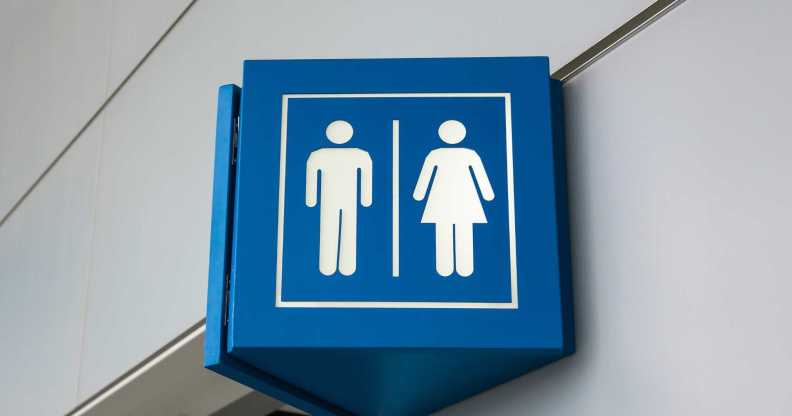Civil servants slam draft gender policy for ‘centring anti-trans views’

Officials at the Department of Education have published an open letter criticising the civil service’s ‘transphobic’ draft gender policy. (Getty Images)
Officials at the Department of Education (DfE) have published an open letter criticising the civil service’s “transphobic” draft gender policy, calling plans to restrict trans staff’s access to single-sex spaces “completely unacceptable as well as unlawful”.
The proposed policies for Whitehall staff, first leaked to Vice News on Wednesday (12 July), include changes to toilet access, which would result in only trans people who hold a Gender Recognition Certificate (GRC) being able to use single-sex facilities that align with their gender identity.
It is estimated that just one per cent of trans people in the UK hold a GRC, and under current guidance, civil servants can use “any appropriate single-sex toilets and other facilities”.
Trans civil servants have already expressed “horror” at the “degrading” and “hostile” policy proposals.
On Saturday (16 July), the Telegraph reported details of an open letter published on the DfE’s intranet from staff in the department’s LGBT+ Network. The letter outlined their concerns regarding the draft guidance, which is set to be released this week, and condemned the revisions “in the strongest possible terms”.
The draft gender policy document, weighing in at 39 pages, has been put together by the Cabinet Office and Government People Group and proposes changes to the civil service’s “gender identity and intersex policies”.
Covering Britain’s approximately half a million civil servants – politically impartial officials integral to the functioning of central government departments – the guidance states that staff should equally recognise “gender critical beliefs” and “gender identity beliefs”. This means that civil servants would ostensibly be able to share anti-trans views without being penalised.
The document also states that employees who do not believe people can change sex or gender must be “treated with respect and dignity and protected from bullying, harassment and discrimination”.
‘Discriminatory and unlawful proposals’
In their open letter, the DfE’s LGBT+ Network describes the new policy as including “discriminatory and unlawful proposals on single sex spaces” and says that it “centre[s] gender critical beliefs in guidance that should protect and support transgender people”.
The letter reportedly calls on the Department for Education’s permanent secretary, Susan Acland-Hood, to withdraw the guidance and “commit that DfE will not implement the model guidance should it be published in its current form”.
The DfE’s LGBT+ Network goes on to criticise the draft guidance for drawing a “false equivalence between trans employees’ existence and the beliefs of another group” and making “troubling references to the views of non-trans staff needing to be taken into account in implementing this policy”.
“The reference to gender identity being equivalent to a belief in gender critical views denies trans people’s validity and humanity,” the Telegraph reported the letter as reading.
“This is unacceptable as it would reduce gender diverse staff to the status of second class citizens in the workplace.
“Trans staff in DfE report discrimination, bullying and harassment at almost three times the rate of cis staff; it is deeply troubling for a policy purportedly for and about trans and intersex staff to centre anti-trans views.”
The open letter describes the draft policy as using “transphobic language” and “trans exclusionary language commonly used to harass and delegitimise trans people”, and calls it a “clear step backwards”. It also claims that no trans civil servants were consulted in the process of putting together the guidance, although “a large number of non-experts” were consulted.
A Cabinet Office spokesperson told PinkNews: “This is a draft document and not civil service HR policy.”
They also confirmed that draft changes have not been reviewed by ministers, internal HR documents would not be published and civil service HR policies are regularly reviewed, including consulting with staff networks.
How did this story make you feel?

